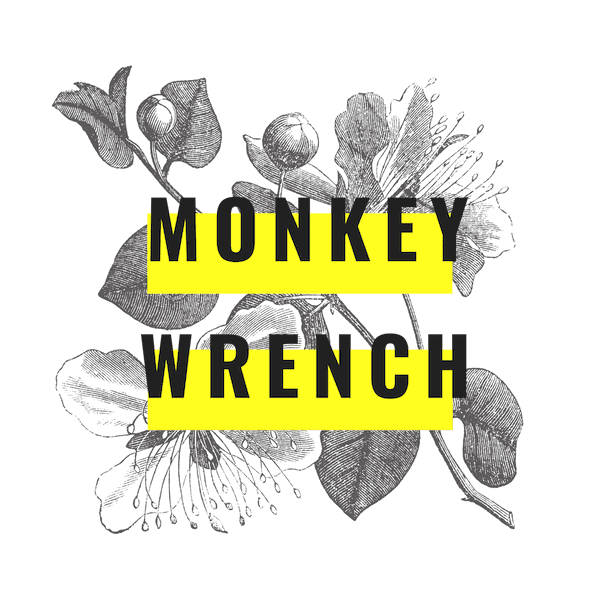Greenhouse Pioneer
Dr Alexandra Jellicoe, Monkey Wrench

We want to share the story of environmental scientist Dr Alexandra Jellicoe, founder of environmental culture and lifestyle magazine, Monkey Wrench, and author of The Splitter.
We caught up with Alex to learn more about Monkey Wrench, what inspires her and her passion for improving public and environmental health.
1. Tell us in 20 words or fewer about Monkey Wrench – what’s your mission?
Monkey Wrench is an opinion forming culture and lifestyle eco-blog passionate about finding solutions for environmental restoration.2. What drives you?
I grew up in Nigeria and Sudan and could never come to terms with the poverty and preventable sickness I witnessed there. My PhD focused on developing policy for the WHO Guidelines for Drinking Water Quality, specifically to reduce the deaths of under 5’s due to lack of access to clean water. My last role with Oxfam was drilling for water for the Turkana tribes of Northern Kenya who have suffered on-going drought and famine increasingly due to climate change. Climate change is the greatest public health risk the world has ever (and will ever) experience. The longer it goes on the more people will be affected. We are beginning to see the consequences here in the UK now as well. I have kids, I need a safe planet for them to grow up on and currently nowhere is safe. Public and environmental health scientists/engineers carry out critical work to ensure the good health and prevention of infectious disease to populations. This job is difficult at the best of times but climate change is going to make it almost impossible. But my feeling is that what is most needed right now is a huge leap in public understanding about the environmental consequences of our lifestyles and economies. I want to help people join the dots about the causes of climate and ecological breakdown, as well as envisage a sustainable future where communities health and wellbeing are prioritised.3. What is your greatest achievement to date?
Having three happy, healthy children and I’d like them to stay that way.4. What are the challenges you face?
For many years I was afraid to speak out about what I knew and had seen. It wasn’t socially acceptable to mention climate change so I almost kept my work a secret not wanting to bum everyone else out with bad news. That changed after the IPCC report was published in 2018. I couldn’t be silent any longer.5. What are you working on that’s getting you fired up and excited?
Covid 19 has put most of my projects on hold. I was about to launch the first issue of Monkey Wrench magazine due this June but now doesn’t feel like a good time for that initiative. I’m now in talks with a publisher about writing a popular science book about how environmental and human health are intertwined. You can’t have one without the other. I classify Covid 19 as an environmental disaster.6. Where do you want to take Monkey Wrench next?
Monkey Wrench is on hold for the next year whilst I try to understand the new cultural landscape we’re living in and see how we can be most useful.
Monkey Wrench magazine
7. What can we, as individuals, do to make a difference?
There are some really useful things you can do like switch to a renewable energy supplier, switch to a green bank, eat less meat and buy less stuff but the most useful contribution is to become an active citizen. This means seeking out the truth about the world we have created and how it must change for the health and safety of ourselves and our children and using this understanding to be politically active.8. How is what you are doing inspiring change in others?
I find the best way to inspire others is talking to them face to face. The environmental crisis is so complicated and intertwined with people’s lives that each individual has a unique concern, feeling or outlook on it and the changes that are needed. I think about how to communicate to those people most of my waking hours. And I hope that in some ways I’ve helped people understand it in a way that they can make positive change.
9. Can you recommend a life- or game-changing book for our readers?
For me it was How Forests Think by Eduardo Kohn but it’s quite academic. A more accessible version is The Hidden Life of Trees by Peter Wohlleben. Understanding how trees think and work as societies opened my mind up to a whole new understanding of how the world works far beyond my limited human senses. Forests operate on a vast timescale and tree’s are interdependent on one another so altruism is essential for their survival – mind blowing, huh?10. What do you listen to when you’re cooking dinner?
BBC Radio 6, the New Yorker Fiction podcast or The Paris Review poetry podcast – as a communicator I’m obsessed with language.11. What’s the best advice you’ve ever been given?
‘You are only as healthy as the land that you walk on.’ Turkana elder.12. Can you leave us with who’d be your Eco Hero?
Satish Kumar – he is an important spiritual voice and we don’t talk about this enough.If you are interested in following Dr Alexandra Jellicoe’s work you can stay up to date by following her on Twitter and Instagram.


